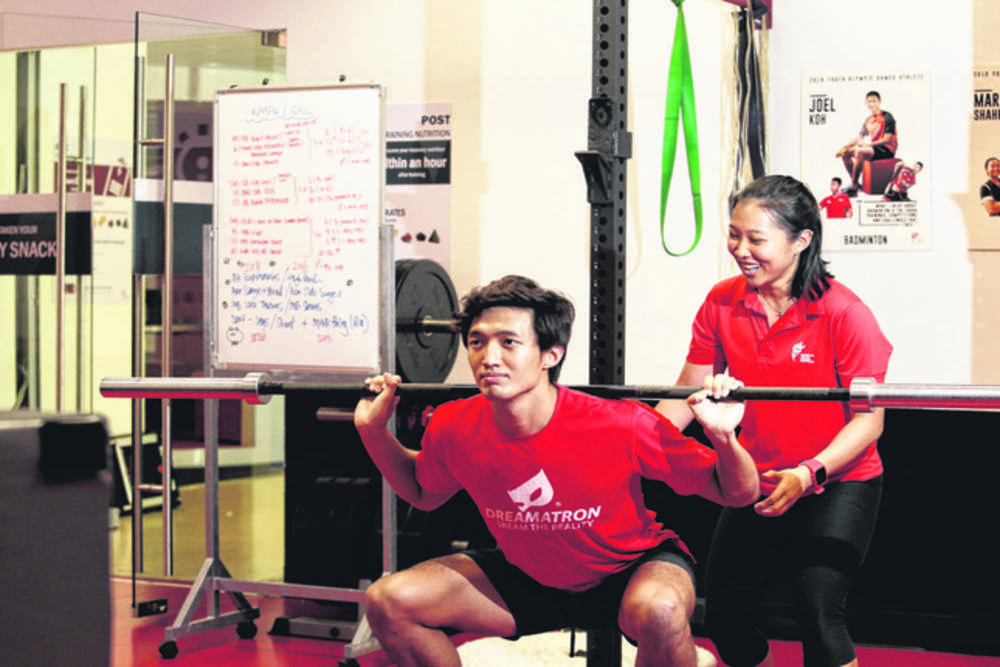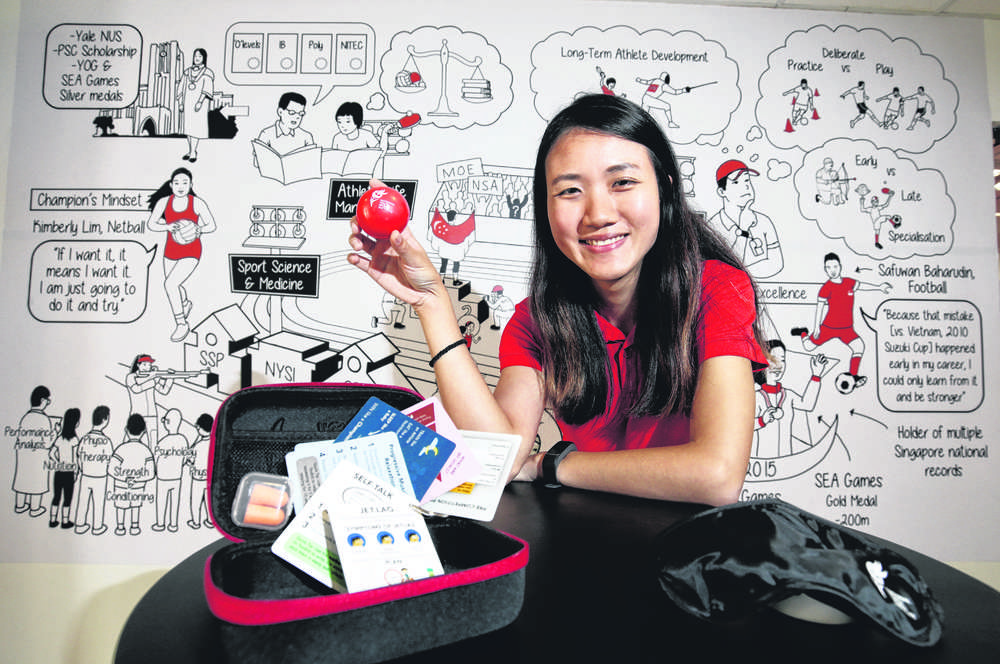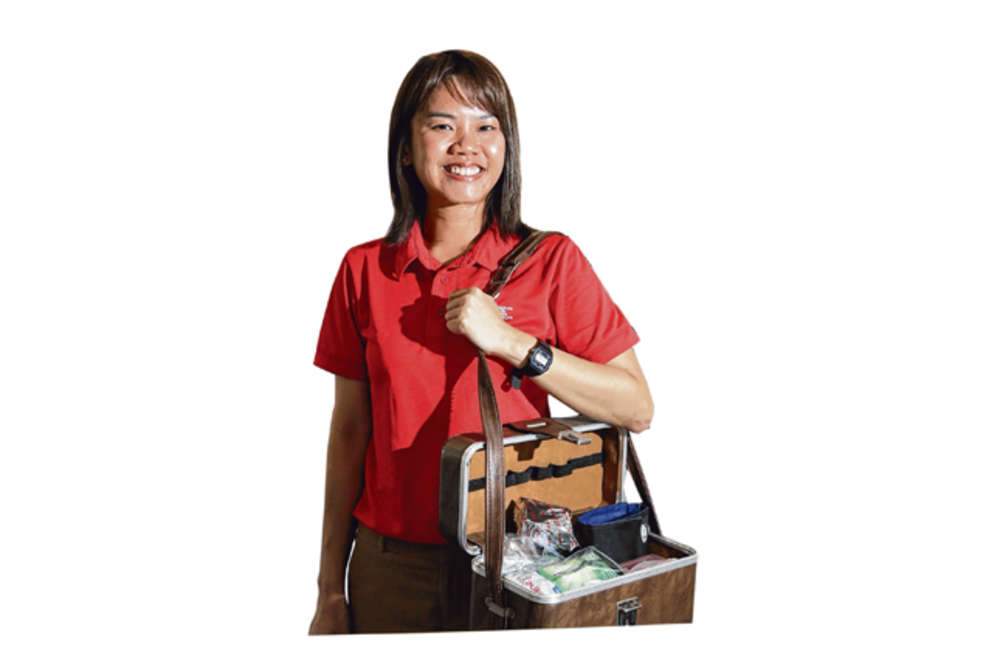Facing Challenges in the Best Possible Form
Interview with Elaine Gay (倪薇芳), NYSI Strength and Conditioning Specialist:

Elaine Gay, NYSI Strength and Conditioning Specialist. (Photo: zbschools)
Even injury prevention requires hard work
zbschools: What are the common injuries amongst student-athletes?
Elaine: At this age, the common injuries include back, shoulders and joint-related injuries. With increased intensity, wrong techniques or over-exhaustion, the athlete is prone to sustaining injuries. Do take note that should the pain persist for more than three days, or becomes intolerable, the athlete should consult a doctor immediately.
zbschools: Are there any methods for injury-prevention?
Elaine: Prevention is better than cure, and it requires hard work. One can start from working on his sense of balance and strengthening the smaller muscle groups, such as the muscles at the shoulders, calves, and feet. Rather than expecting to achieve results as quickly as possible, one should instead, focus on building a stronger foundation and correcting his technique instead.
zbschools: What should you take note of while exercising?
Elaine: Not a single muscle group should be left out during warm-up! For example, runners should not assume that it is sufficient to only limit warm-up to their leg muscles—they should include their back and arm muscles as well as running engages these muscle groups too. In addition, one should not try any new workout, equipment or shoes just before a competition and just stick to what he is used to and comfortable with.
zbschools: How should we ensure recovery after a workout?
Elaine: The steps for recovery are especially important, ranging from doing proper stretches accompanied with proper nutrition and rest.
Interview with Shermaine Lou (刘舒), NYSI Sport Psychologist:

Shermaine Lou, NYSI Sport Psychologist. (Photo: zbschools)
Pre-competition nerves are normal
zbschools: What should one do when he is nervous before a competition?
Shermaine: It is only normal to feel nervous if the competition means a lot to you. Some common signs of nervousness include cold sweat, vomiting and the constant need to visit the toilet etc. Some people experience psychological effects such as an accumulation of pessimistic thoughts. However, the main focus should not be about anxiety itself, but on how to manage it well. One way to deal with anxiety would be to exercise imagery where one imagines himself to achieve the best performance on the competition ground. Alternatively, one can also engage in positive self-talk where he tells himself that he is able to achieve his goals and focuses on his strengths. All these techniques can help psych one up mentally.
zbschools: How can stress management be improved?
Shermaine: Many do not know that stress management is something that can be worked on. Some tend to be unable to breathe properly when experiencing the nerves. In this case, proper breathing exercises can help. One should be conscious of his own emotions and turn negative thoughts into positive ones. For example, when one is tired and tempted to stop his workout, he can instead shift his focus to think of seeking improvement and areas where he can work on.
zbschools: How can one cope with losing?
Shermaine: Most of the time, athletes’ inability to cope with losing is due to the high expectations that they set for themselves when in fact, the most important takeaway should be the experience instead. One has to lose in order to know how to overcome failure. The way forward would be to face it headstrong, reflect on the mistakes made and to stay optimistic. One should also focus on ways to prevent the same mistakes from being committed in the next competition.
Interview with Dr Jamie Lye (赖瀞婷), NYSI Senior Sport Dietician:

Dr Jamie Lye, NYSI Senior Sport Dietitian. (Photo: zbschools)
Proper nutrition requires self-discipline
zbschools: As an athlete, what should one take note of in his diet?
Jamie: What to eat? How much to eat? When to eat? These are three very important questions. Athletes in sports that require large amounts of energy output should consume more carbohydrate-based foods such as rice and noodles; for sports that require less energy, one should consume fewer carbohydrates and more vegetables. One should consume full meals three to four hours before exercise and healthier snacks, such as nuts or raisins, one to two hours prior to a workout. Sport burns a lot of energy and hence, recovery is of utmost importance. Athletes should consume food within one hour after a workout. Drinking milk or consuming dairy products one to two hours before sleep can help to replenish nutrients as well.
zbschools: Can athletes eat fast food?
Jamie: I would not recommend any restrictions on one’s diet—that would depend on one’s personal choices. However, do note that fast food is usually deep-fried and I would not recommend it as it would be difficult for the body to digest.
zbschools: Would it be helpful to consume supplements or TCM products?
Jamie: At this age, nutrition from food products would be sufficient. As the origin and ingredients of many supplement products are unclear, it could prove to be a bad combination with certain food, and could be a prohibited food substance for athletes. I would strongly not recommend supplement products but general herbs are fine for consumption.
Support for youth athletes
The NYSI (National Youth Sports Institute) was set up in 2015 with the aim of providing support for high-performance student-athletes. It provides Athlete Life, Sports Science and Youth Coaching support. Youth athletes can build a strong base with the help of the institution’s support.
Leslie Tan, Head of NYSI Athlete Life, said that one of the biggest challenges that youth athletes face is striking a balance between their academic commitments and sporting pursuits. The NYSI conducts regular workshops to address this issue and welcome all student-athletes to participate.
Stay connected with the latest updates at our Facebook page and Instagram (@nysi_sg).